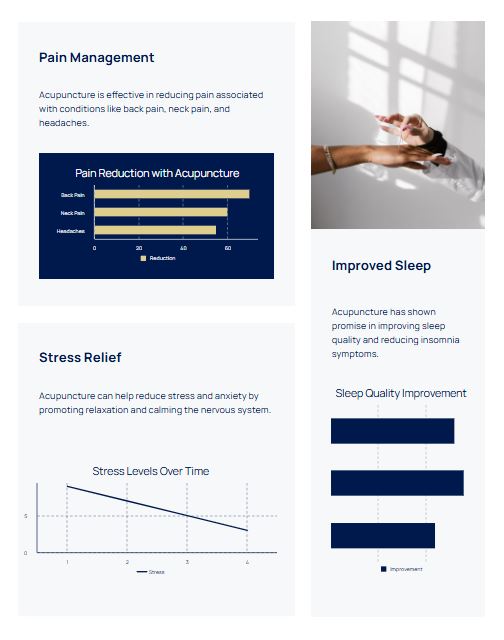Understanding Acupuncture
Acupuncture is a holistic healing practice rooted in Traditional Chinese Medicine (TCM) that involves inserting thin needles into specific points on the body. This ancient technique aims to restore the flow of energy, known as “Qi” (pronounced “chee”), and promote overall well-being. Acupuncture has been practiced for thousands of years, with its origins tracing back to ancient China. While it may appear simple, the underlying principles are deeply complex, encompassing various theories about health and illness.
Acupuncture aims to restore balance to the body’s energy by addressing blockages or imbalances that can lead to physical or emotional issues. A Licensed Acupuncturist plays a crucial role in this process by identifying these blockages and using specialized techniques to help restore the smooth flow of Qi. When Qi flows freely, the body can maintain better health and recover from illness more effectively. Understanding how acupuncture works is key to appreciating its effectiveness as a therapeutic treatment.

The Principles of Acupuncture
The practice of acupuncture is based on several fundamental principles that form the foundation of TCM. These principles guide practitioners in diagnosing and treating various conditions.
- Qi and Meridians: According to TCM, Qi flows through a network of pathways called meridians. These meridians connect different organs and systems within the body. Each acupuncture point corresponds to a specific meridian, allowing practitioners to influence the flow of energy and restore balance.
- Yin and Yang: This ancient philosophy describes the dual nature of existence, where opposite forces are interconnected and interdependent. Yin represents qualities such as coolness and passivity, while Yang signifies heat and activity. Acupuncture aims to harmonize these opposing forces within the body to achieve overall health.
- Five Elements: This theory associates various aspects of life, including seasons, emotions, and organs, with five fundamental elements: wood, fire, earth, metal, and water. Practitioners use this framework to diagnose imbalances and determine the appropriate acupuncture points to stimulate.
Understanding these principles helps practitioners tailor treatments to individual needs, addressing both physical symptoms and underlying emotional or spiritual issues.
How Acupuncture Works
Acupuncture works by stimulating specific points on the body, which can have a range of physiological effects. The process begins with a thorough assessment by the acupuncturist, who evaluates the patient’s health history, symptoms, and lifestyle.

Key Mechanisms of Action:
- Stimulating Nerve Endings: Insertion of needles at acupuncture points stimulates the nervous system, promoting the release of neurotransmitters and hormones. This process can lead to pain relief, reduced inflammation, and improved circulation.
- Enhancing Blood Flow: Acupuncture improves blood circulation to specific areas of the body, facilitating healing and regeneration. Increased blood flow can help deliver essential nutrients and oxygen to tissues, enhancing recovery.
- Balancing Hormones: Acupuncture can influence the endocrine system, helping to regulate hormone production. This balance is particularly beneficial for conditions such as stress, anxiety, and hormonal imbalances.
These mechanisms contribute to acupuncture’s effectiveness in treating a wide array of conditions, including chronic pain, migraines, digestive disorders, and mental health issues.
Benefits of Acupuncture

Acupuncture offers numerous benefits, making it a popular choice for individuals seeking alternative and complementary therapies. Some of the key advantages include:
- Pain Relief: Acupuncture is well-known for its ability to alleviate various types of pain, including back pain, joint pain, headaches, and muscle tension. Many patients report significant reductions in pain levels after just a few sessions.
- Stress Reduction: Acupuncture promotes relaxation and can help reduce anxiety and stress. The release of endorphins and other neurotransmitters during treatment contributes to an overall sense of well-being.
- Improved Sleep Quality: Many individuals find that acupuncture helps improve their sleep patterns. By addressing underlying issues such as anxiety or chronic pain, acupuncture can lead to more restful sleep.
- Enhanced Digestive Function: Acupuncture has been shown to benefit individuals with gastrointestinal issues, including irritable bowel syndrome (IBS), nausea, and indigestion. By stimulating specific points, practitioners can help regulate digestive processes.
- Support for Emotional Health: Acupuncture can address emotional issues such as depression and anxiety. By promoting relaxation and balancing hormones, patients often experience improved emotional stability and well-being.
Common Misconceptions About Acupuncture
Despite its growing popularity, several misconceptions about acupuncture persist, which can deter individuals from trying this beneficial practice.
- Needles and Pain: Many people fear acupuncture due to the use of needles. However, acupuncture needles are incredibly thin, and most patients report minimal to no discomfort during treatment. The focus is on relaxation and healing rather than pain.
- Only for Pain Management: While acupuncture is often associated with pain relief, its benefits extend far beyond that. It can address a wide range of health issues, including digestive disorders, respiratory conditions, and mental health concerns.
- Immediate Results: Some individuals expect immediate relief from their symptoms after one session. Acupuncture is often most effective when practiced consistently over time, with many patients experiencing cumulative benefits.
Understanding these misconceptions can help individuals make informed decisions about incorporating acupuncture into their wellness routines.
Finally:
Acupuncture is a powerful healing practice with deep roots in Traditional Chinese Medicine. By focusing on restoring balance within the body, it offers a holistic approach to health that can benefit individuals across a spectrum of conditions. The principles of Qi, Yin and Yang, and the Five Elements guide practitioners in tailoring treatments to meet the unique needs of each patient.
For those considering acupuncture, working with a Licensed Acupuncturist ensures safe and effective treatment. These professionals possess the necessary training and expertise to provide personalized care, making acupuncture a valuable addition to any wellness journey. Whether seeking relief from chronic pain, stress management, or overall well-being, acupuncture can play a significant role in promoting a healthier, more balanced life.




